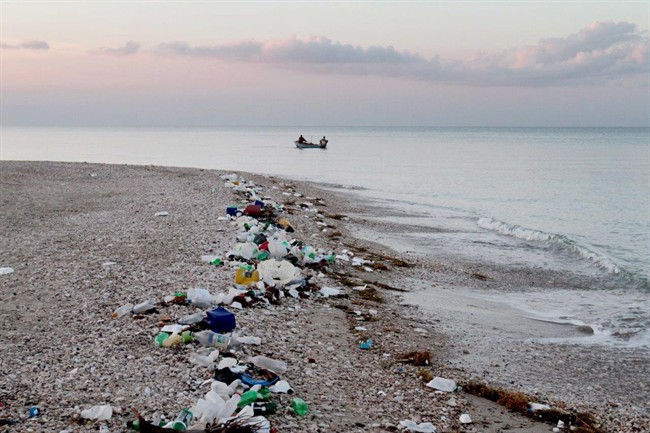Five organizations have teamed up with the Government of Canada to provide teachers with a new education kit to help teach students about plastic pollution and how it affects our environment.

Currently, there’s more than 150-million tonnes of plastic waste in the world’s oceans. More than 40 per cent of plastic produced each year is used just once and then thrown away.
The Ocean Plastic Education kit officially launched Monday and includes resources for teachers, students and parents to learn more about plastic pollution.
READ MORE: Halifax’s Tufts Cove ‘one of the dirtiest urban beaches I’ve encountered’
“It’s not just a textbook, it’s something that you can actually experience and interact with in a meaningful way,” said Dalhousie marine biologist, Boris Worm.
“Plastic is one of the main challenges we see in our daily lives that affect the ocean so we wanted to provide easily accessible, interesting, fun resources for people to learn more about the plastic pollution problem and also what they personally can do to solve this.”
Among the ways to solve the problem is changing behaviour. The education kit encourages students to look at how they use plastic and what they can do to use less, such as swapping plastic water bottles for reusable ones. It also encourages teachers and students to organize beach cleanups.
Jacques Gautreau with Ocean School said getting young students involved is critical.
“We’ve certainly found in some of our work where the change in behaviour comes from the younger people in the family,” he said.
WATCH: Pressure mounts on Canada to devise solution to stop plastic pollution

Currently, the education kit includes videos and activities for students, and in November, Ocean School will be adding a virtual reality game to get students even more emotionally involved.
The game is for two players with one student controlling the timeline from the end of the Second World War to today.
“The other student is being a diver and experiencing what it would be like to be underwater through that timeline and to understand the accumulation and the impact of plastic in the ocean,” said Gautreau.
The launch of the education kit coincides with the annual meeting of G7 Environment, Oceans and Energy Ministers which is taking place in Halifax from Sept. 19-21.
- Canadian man dies during Texas Ironman event. His widow wants answers as to why
- ‘Shock and disbelief’ after Manitoba school trustee’s Indigenous comments
- Several baby products have been recalled by Health Canada. Here’s the list
- ‘Sciatica was gone’: hospital performs robot-assisted spinal surgery in Canadian first




Comments